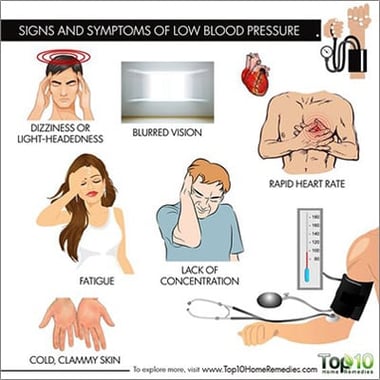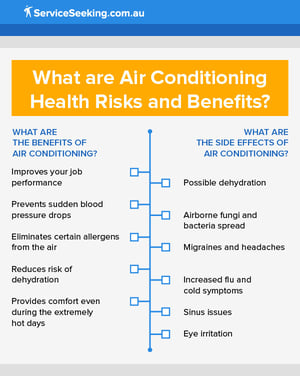The main benefit of air conditioning is protecting you from severe heat that can have extremely bad consequences for your health. The air conditioner health risks are based on the spread of germs, bacteria, viruses and fungi when the unit’s filters are not replaced regularly.
Those are the basic, underlying reasons for all health benefits and risks of air conditioning systems. What you want, of course, is to increase the benefits and reduce the risks.
Since the risks can be eliminated by regular maintenance and the proper air conditioner installation, you need to find a reliable installer.
Only a certified air conditioner installer can do air con installation in Australia. Get quotes from experts and then hire the most suitable one for your air conditioning system.
What Are the Advantages of an Air Conditioner?
We already mentioned that the main advantage of air conditioning is the temperature regulation that enables you to function properly. Severe heat has many negative effects on your health. Here are the main advantages of air conditioning:
1. Improves your job performance
Employees usually perform better if they work under optimal temperatures during winter and summer alike. In winter, the temperature should be around 21-22 C, while in the summer months, it can go from 24-25 C.
There is a study from Helsinki University of Technology Institute of Heating Ventilating and Air Conditioning Espoo, Finland, that was conducted on the best temperature, which would ensure the best job performance of the employees in an office. It showed that with every degree from 25 C down, the office productivity was increased by 2%.
2. Prevents sudden blood pressure drops

Image from Pinterest
Some people, usually women, suffer from low blood pressure. The symptoms are sluggishness, headaches, drowsiness and blurry vision.
With increased temperatures, the blood vessels in your body expand, causing the blood pressure in them to drop. Therefore, when the air conditioning system regulates the temperature and maintains it steadily at an optimal level, there is no risk of a sudden blood pressure drop.
3. Eliminates certain allergens from the air
Those split system air conditioners that recycle the air that is taken from the room decrease the chances for the pollen to get inside the room. This can help those who suffer from this very common allergy.
Image from Pinterest
Usually, the split systems suck the air from the room and then cool it with the chilled refrigerant gas that reaches low temperatures by a system of compression. This refrigerant eliminates the heat from the air and returns the air into the room – chilled. Therefore, there is no outside air that could reach people in such rooms.
4. Reduces risks of dehydration
Severe heat means excessive sweating, and that leads directly to a state of dehydration. This is where the air conditioning system can help by creating an environment without the hot temperatures.
However, cooling the room too much can lead to the same result. Rooms in which the air conditioning works all the time usually have dry air. Air conditioning systems are known to make the air dry. This is also a factor that can cause dehydration, so it is something to keep in mind when picking the best room temperature.
5. Kills off insects and some parasites
Summer is the time when insects thrive. When the autumn comes, they seem to disappear. This is because insects hate cold weather. Cold temperatures make them hibernate, escape or even die. Those are the conditions that air conditioning mimics, so that is why it can help you get rid of pesky insects.
A similar thing is true for different fungi, bacteria and parasites. The cold and dry air are not the conditions that parasites would consider ideal. That is why air conditioning can help eradicate them.
6. Provides for comfort even during the extremely hot days.
It is difficult to focus on anything but sweating when the air is too hot. Your blood pressure drops, your brain doesn’t get enough oxygen, and your circulation simply slows down. That’s why heat is uncomfortable. This is one benefit that we all appreciate very much – air conditioners make it easy to survive the summer heat.
What are the Disadvantages of Air Conditioning?
We are all very grateful for air conditioning and all the benefits it gives us, but there are some risks that need to be taken into account. The disadvantages of air conditioning come from dirty filters and irregular maintenance. Here are some disadvantages of air conditioning:
1. Possible dehydration
Dehydration is usually a consequence of excessive heat. However, if your air conditioning is on maximum, it will make the air extremely dry. When that happens, your membranes get dried, and they need to be kept moist.
Your body then extracts all the water it can from your system, turns it into mucus, saliva, and tears and tries to fix that dryness issue. This means you will soon spend your water reserves and it will leave you dehydrated.
2. Airborne fungi and bacteria spread
While insects and parasites hate the dry and cold air, air conditioning is the worst possible option for them. Fungi and bacteria don’t like it either, but there is one place where they can find their refugee – the air conditioning filters.
If these filters are not replaced every 1 to 3 months, your air conditioner may end up dispersing the dust, fungi and bacteria all over your home or office.
3. Migraines and headaches
Except this, all other problems are not directly caused by an AC. All the other disadvantages are simply worsened a bit by the air con, or the air con creates the environment in which these issues more easily occur.
Migraines and headaches are the only direct consequence of the air conditioning itself. The migraines can be caused by air conditioning dehydration. Also, they can be caused by cold temperatures that trigger the reaction of a nerve in the central nervous system. This nerve causes the blood vessels to shrink, and that creates migraines.
4. Increased flu and cold symptoms
Your common cold and flu symptoms are redness of the throat, which is also sore, nasal congestion, fever, coughing and similar. All these symptoms can be worsened by your air conditioning system. This happens because of the dry air.
Dry air dries your membranes and they are more susceptible to cracks and breaking. This creates irritations and causes coughing, soreness and excessive mucus production. Moreover, it creates the direct entry into the bloodstream for viruses and bacteria.
5. Sinus issues
The issues that air conditioning causes for your sinuses are pressure, congestion, runny nose and pain. All this happens due to the increased air dryness that further causes dry sinuses.
When the sinuses are dry and cold, the mucus starts to build up to make them moist again. All that mucus buildup causes pressure in your nose, headaches, congestion and reduced airflow.
6. Eye irritation
Air dryness causes dry eyes. Tears will be produced to maintain the level of moisture in your eyes since they should never be completely dry to avoid irritation and friction with the eyelids.
Air conditioning causes dry air and can help spread harmful microorganisms in your home. Both of these downsides can be prevented. Dry air can be helped with the use of a humidifier and also by maintaining a slightly higher temperature.
The buildup and the spread of harmful dust, dirt and microorganisms are prevented by regular maintenance. One annual clean-up is necessary, and filter replacement should be done from 1 to 3 months. It is best if you find a professional to do it thoroughly.
Get quotes from air conditioner installers who can also help you with your maintenance and cleanups. It is a matter of your health, so talk to several experts before you find the one that you trust. Seeking Service gets you in touch with the best of the best.
